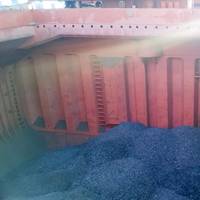INTERCARGO Advisory on Cargo Liquefaction Dangers

Cargo liquefaction continues to be a major risk for dry bulk shipping.INTERCARGO welcomes the latest amendment to the International Maritime Solid Bulk Cargoes Code (IMSBC 04-17) which entered into force on 1st January 2019 and includes important updates related to cargoes that may liquefy. Pertinent updates include: changes to section 4.5 of the Code which stipulates the shippers’ responsibility to ensure that the testing and sampling for Transportable Moisture Limit (TML) and moisture content is carried out at the correct intervals…
Intercargo Calls for Bulk Carrier Safety
The International Association of Dry Cargo Shipowners (Intercargo) issued a statement which again reminds stakeholders of the continued dangers associated with the carriage of bulk cargoes that may have a potential for liquefaction. The recent capsize and sinking of the Bahamas flag Bulk Jupiter in the opening days of January, with the loss of 18 of its 19 crew, may again prove to be yet another casualty statistic in the long list of bulk carrier losses caused by cargo liquefaction. The ship had reportedly loaded a cargo of Bauxite at Kuantan, Malaysia. In any such incident, our first thoughts will always be with the families of the crew members that have lost their lives and Intercargo welcomes a swift and thorough investigation into this tragic incident…
Drewry’s: Container Freight Rates Headed Higher
The recent successful implementation of significant rate restoration initiatives by carriers in the core east-west trade lanes means that most are now operating above break-even. Carriers took sufficient capacity out in the winter months to ensure that recently re-activated services have not caused too much damage to the supply/demand balance and load factors on the eastbound transpacific remain strong. However, with the worsening situation in Europe, we do not foresee a strong peak season this year and carriers will experience some rate erosion during the summer months. Evergreen’s decision to launch another weekly loop this month is not a positive and the Asia-Europe trade is most at risk because of the need to fill more 12,000+ teu ships every week.
ABS President Comments on Bulk Carrier Safety
At the Seatrade International Maritime Convention in London, ABS President and CEO, Robert Somerville commented on Bulk Carrier Safety.It was in the tumultuous period when the tanker industry was still trying to adjust to OPA90, to the mandate for double hulls, to the uncertainties of COFRs and all the rest of the restrictions that were being placed on their operations.It was also a time when there had been a casualty, with a small amount of pollution, involving a bulk carrier.Of course the incident was portrayed the media as another “tanker” casualty.That owner was very, very frustrated.His basic argument was that his dry bulk brethren just “didn’t get it.”That it was not just tanker operators who had been thrust into an entirely different ballgame.
Opinion: ABS President Discusses Bulk Carrier Safety
ABS President and CEO, Robert Somerville recently discussed Bulk Carrier Safety at a conference in London. His speech, in part, follows. It was in the tumultuous period when the tanker industry was still trying to adjust to OPA90, to the mandate for double hulls, to the uncertainties of COFRs and all the rest of the restrictions that were being placed on their operations. It was also a time when there had been a casualty, with a small amount of pollution, involving a bulk carrier. Of course the incident was portrayed by the media as another "tanker" casualty. That owner was very, very frustrated. That it was not just tanker operators who had been thrust into an entirely different ballgame. It was the industry.
The Profits Black Hole: Container Shippers Still Unable To Turn Growth Into Profit
A new report from Drewry Shipping Consultants Ltd., titled "Container Market Outlook," estimates that in 1998 carriers lifted 14.7 percent more cargo than in 1996 (more than 7.2 million teu), but somehow contrived to earn 1.2 percent less revenue. Industry profitability has also declined, with the Asian crisis making 1998 a particularly bad year, and on the main east-west trades Drewry estimates aggregate carrier losses at almost $2.4 billion - a negative margin of more than eight percent. In 1999, carriers, driven perhaps by desperation, have addressed the revenue gap with more aggression than ever before. Massive rises on Asian export…






